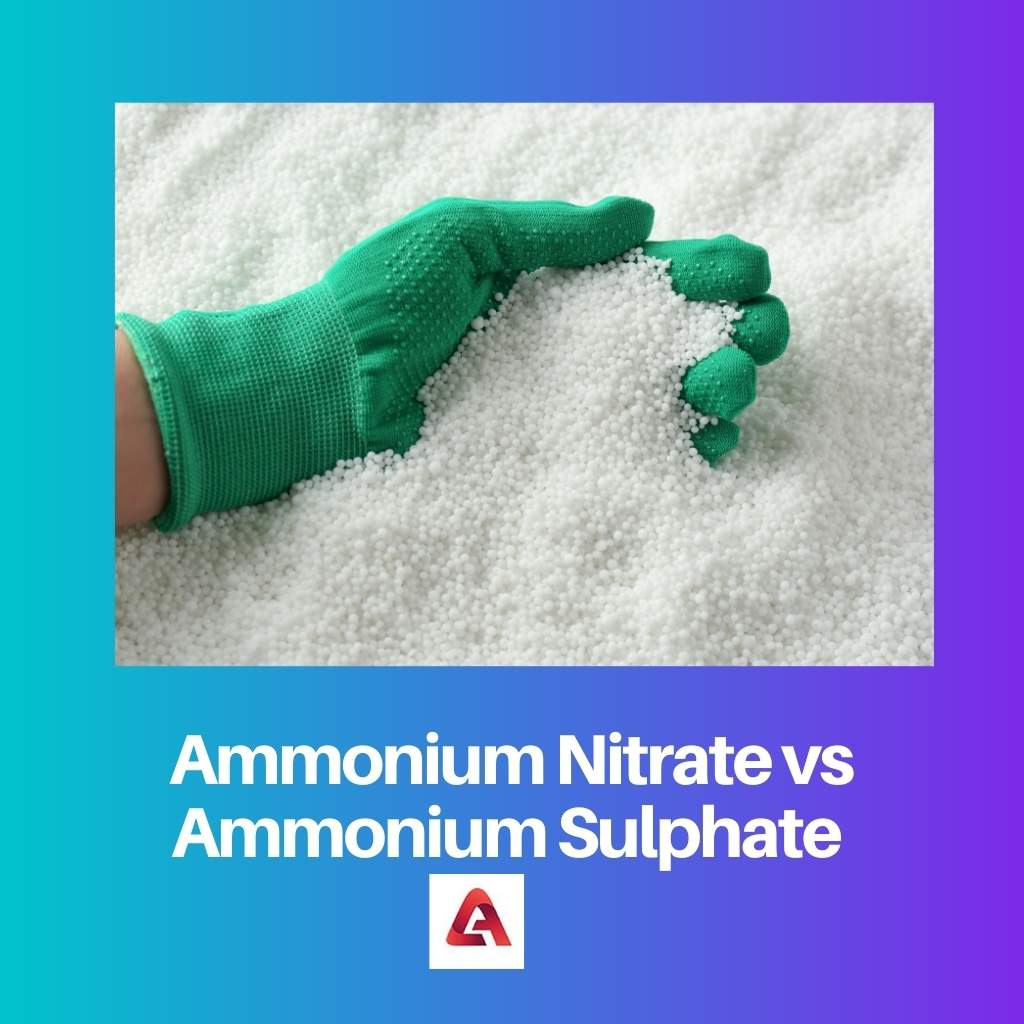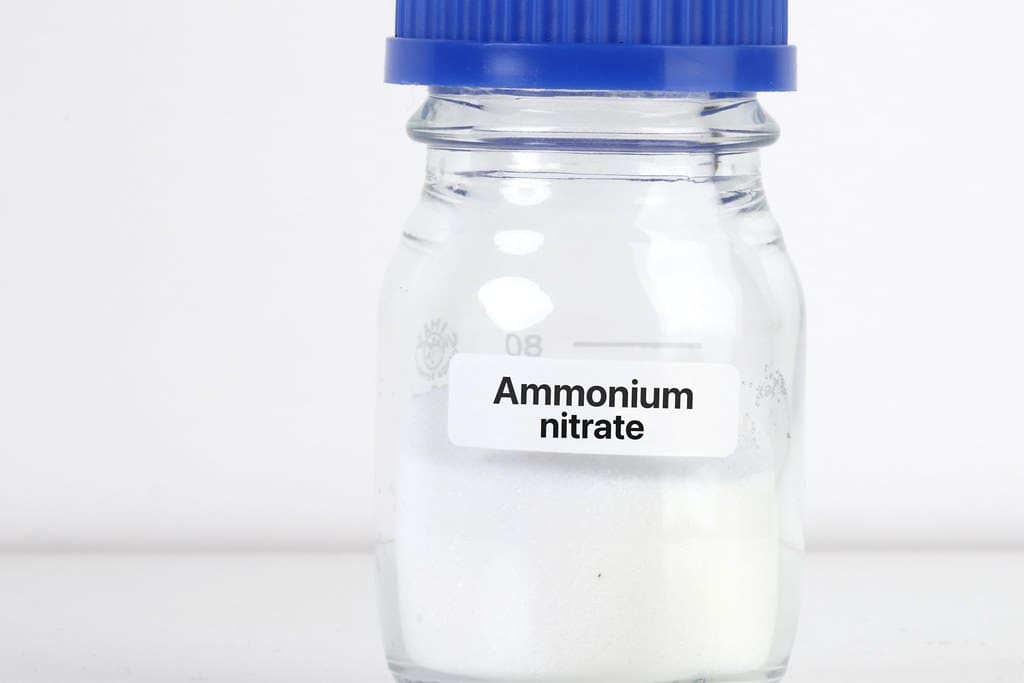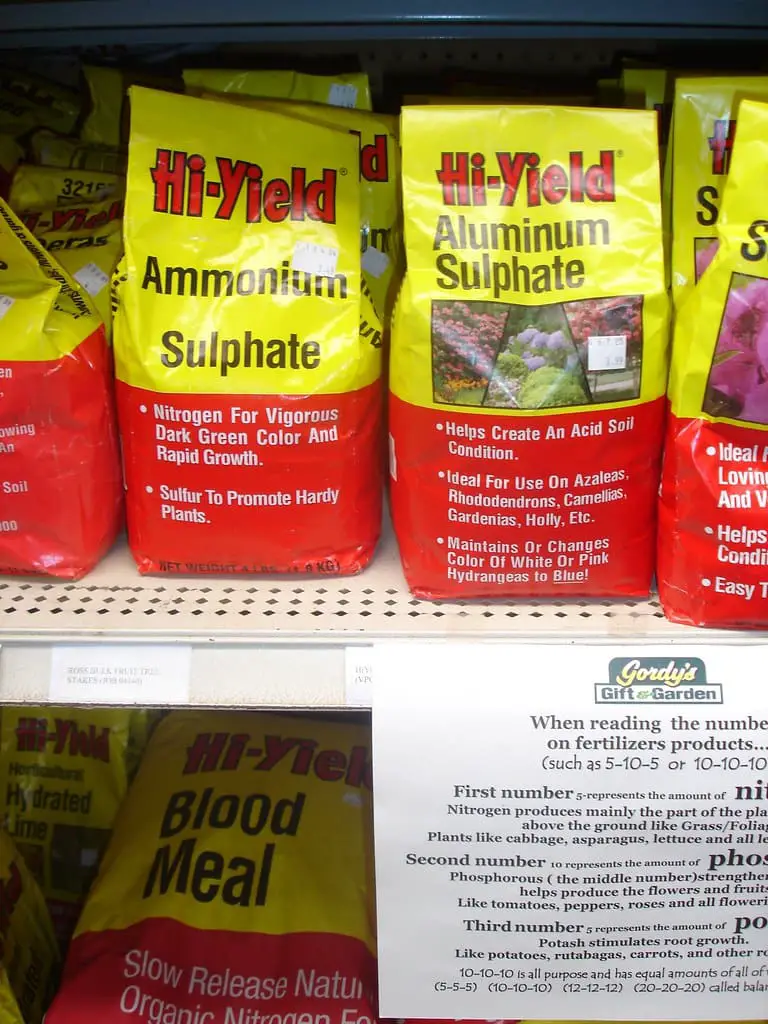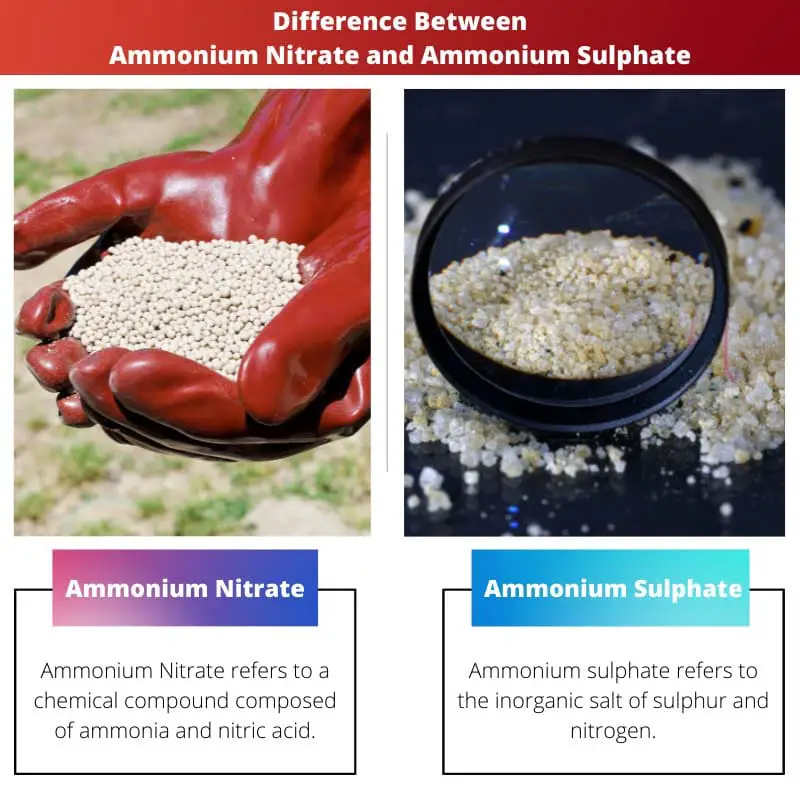Ammonium Nitrate and Ammonium Sulphate refer to two crystalline chemical compounds mistaken for each other.
The former, however, is a composite of ammonia and nitric acid, while the latter is an inorganic salt of sulphur and nitrogen.
It is, therefore, important to differentiate between the two to prevent any hazardous after-effects of the misuse of these chemicals.
Key Takeaways
- Ammonium nitrate contains 33% nitrogen, while ammonium sulphate has 21% nitrogen content.
- Ammonium nitrate is highly explosive, whereas ammonium sulphate is non-explosive.
- Ammonium sulphate improves soil acidity, while ammonium nitrate doesn’t affect soil pH.
Ammonium Nitrate vs Ammonium Sulphate
Ammonium Nitrate forms from the reaction between Ammonia and Nitric Acid, and Ammonium Sulphate forms from the reaction between Ammonia and Sulfuric Acid. Ammonium Nitrate is Exothermic and is useful as a fertilizer for acidic soils; Ammonium Sulphate is Endothermic and is useful for alkaline soils.

Ammonium Nitrate refers to a chemical compound composed of ammonia and nitric acid. Its formula is NH₄NO₃ and has a molar mass of 80.043 g/mol.
Ammonium nitrate easily dissolves in water and is hygroscopic as a solid. The most significant use of ammonium nitrate is as a nitrogen-rich fertiliser in agriculture.
Ammonium sulphate refers to the inorganic salt of sulphur and nitrogen. Its formula is (NH₄)₂SO₄ and has a molar mass of 132.14 g/mol.
Ammonium sulphate is soluble in water. The most prominent use of ammonium sulphate is as a soil fertiliser.
In addition, ammonium sulphate can be used as a food additive since it is a safe compound.
Comparison Table
| Parameters of Comparison | Ammonium Nitrate | Ammonium Sulphate |
|---|---|---|
| Definition | Ammonium Nitrate refers to a chemical compound composed of ammonia and nitric acid. | Ammonium sulphate refers to the inorganic salt of sulphur and nitrogen. |
| Chemical Formula | NH₄NO₃ | (NH₄)₂SO₄ |
| Molar Mass | 80.043 g/mol | 132.14 g/mol |
| Practical Application | It has practical application as a component in explosives. | It has practical application as a fertiliser in alkaline soils. |
| Level of Hazardousness | It is a more hazardous chemical in comparison to ammonium sulphate. | It is a safer chemical in comparison to ammonium nitrate. |
What is Ammonium Nitrate?
Ammonium Nitrate refers to a chemical compound composed of ammonia and nitric acid. Its formula is NH₄NO₃, and it has a molar mass of 80.043 g/mol.
With a density of 1.72 g/cm³, ammonium nitrate easily dissolves in water. As a solid, ammonium nitrate is hygroscopic.
It is a colourless and crystalline salt.
Although ammonium nitrate is not explosive on its own, it can form dangerous substances when combined with fuels like fuel oil or aluminium powder.
Some examples of explosives that consist of ammonium nitrate as a component are ANFO, DBX, Astrolite, and Amatex.
Moreover, explosives based on ammonium nitrate came into use during several terrorist attacks, such as the 2011 bombings in Delhi and the 2013 blasts in Hyderabad.
In a more general scenario, ammonium nitrate has practical application in cold packs due to its endothermic property. Another usage of ammonium nitrate is as a nitrogen-rich enhancer in agriculture.
Ammonium nitrate is a good enhancer for plants in acidic soil. It helps to provide the necessary nutrients and minerals for plant growth.
The storage, safety, and handling of ammonium nitrate require utmost attention and consciousness. The reason for the same is that salt is a potentially hazardous substance.
In addition, the manufacturing of ammonium nitrate should be carried out only by industrial professionals.

What is Ammonium Sulphate?
Ammonium sulphate refers to the inorganic salt of sulphur and nitrogen. Its formula is (NH₄)₂SO₄ and has a molar mass of 132.14 g/mol.
With a density of 1.72 g/cm³, ammonium sulphate is soluble in water but not in alcohol or acetone. It is a crystalline salt with no smell and a salty taste.
Ammonium sulphate’s reaction with alkaline substances releases ammonia as a gas.
The most common use of ammonium sulphate is as a soil enhancer for alkaline soils. Its usage as a herbicide is also well known.
Ammonium sulphate burns the leaves of the plants by either weakening them for easy removal or killing them immediately. It also has a use in the manufacturing of flame retardant material and printed circuit boards.
Ammonium sulphate has practical application as an additive due to its relatively harmless nature. The yeast activation property of this inorganic composite helps industrially produced bread to rise.
During the purification process, ammonium sulphate plays a prominent role in developing vaccines. An example is the DTaP vaccine which uses ammonium sulphate for this particular purpose.
The usage of ammonium sulphate should be carried out with utmost care as it can prove to be dangerous for both the people and the environment.
Issues like severe irritation and inflammation of the respiratory tract when inhaled and itching, redness, or pain when in contact with the skin/eyes can be detrimental.
Thus, one must take necessary safety measures like wearing a personal respirator and chemical safety goggles when using ammonium sulphate.

Main Differences Between Ammonium Nitrate and Ammonium Sulphate
- Ammonium nitrate refers to the chemical compound of ammonia and nitric acid. On the other hand, ammonium sulphate refers to the inorganic salt of sulphur and nitrogen.
- Ammonium nitrate, when combined with alcohol, can be used to create explosive items. Ammonium sulphate, however, can be used as a food additive since it is a safe compound.
- The formula for ammonium nitrate is NH₄NO₃. In contrast, the chemical formula for ammonium sulphate is (NH₄)₂SO₄.
- The molar mass of ammonium nitrate is 80.043 g/mol, whereas the molar mass of ammonium sulphate is 132.14 g/mol.
- Ammonium nitrate has practical applications as a substance in the manufacture of explosives. On the other hand, ammonium sulphate has a use as a nitrogen fertiliser for alkaline soils and as a food additive.


This article provides an excellent understanding of the differences between Ammonium Nitrate and Ammonium Sulphate, along with their practical applications and safety considerations. It’s a valuable piece of information for anyone dealing with these chemicals.
The detailed descriptions of Ammonium Nitrate and Ammonium Sulphate offer valuable insights into their chemical properties and applications. It’s essential information for anyone working with these compounds.
The information shared here is of great educational value, shedding light on the crucial aspects of managing and understanding these chemicals.
The comparison table effectively summarizes the key differences between Ammonium Nitrate and Ammonium Sulphate, making it easier to grasp the distinctions.
The detailed descriptions of Ammonium Nitrate and Ammonium Sulphate articulate their chemical properties, practical applications, and safety considerations effectively, providing comprehensive knowledge for individuals dealing with these compounds.
Thank you for the detailed explanation of the differences between Ammonium Nitrate and Ammonium Sulphate. It is important to raise awareness about the correct usage of these chemicals to prevent any hazardous outcomes.
I couldn’t agree more. The knowledge shared here is invaluable and beneficial for anyone dealing with these chemicals.
This article provides an in-depth understanding of Ammonium Nitrate and Ammonium Sulphate, addressing their chemical composition, applications, and safety considerations. It’s enlightening and helps raise awareness about these chemicals.
The detailed explanation of the practical applications and hazardousness levels of Ammonium Nitrate and Ammonium Sulphate is enlightening and emphasizes the importance of responsible usage.
The detailed overview presented here offers valuable knowledge about these chemicals, enabling better comprehension and responsible handling.
The in-depth comparison and detailed descriptions of Ammonium Nitrate and Ammonium Sulphate help clarify their differences and emphasize the importance of proper handling. It’s an excellent resource for anyone seeking comprehensive information about these chemicals.
The informative content offers valuable insights into handling and understanding Ammonium Nitrate and Ammonium Sulphate, making it an essential resource for safety and prevention.
The detailed explanations provided in this article contribute to a comprehensive understanding of Ammonium Nitrate and Ammonium Sulphate, highlighting the need for careful usage and safety protocols.
I appreciate the clear comparison between Ammonium Nitrate and Ammonium Sulphate. The practical applications and level of hazardousness information are particularly insightful.
Absolutely, the detailed comparison helps emphasize the importance of using these chemicals properly.
The detailed comparison is informative and well-presented, making it easier to understand the critical differences between these chemicals.
The information provided here is crucial for understanding the chemical composition, practical applications, and safety considerations of Ammonium Nitrate and Ammonium Sulphate. Thank you for sharing this valuable knowledge.
The comparison table provides a clear overview of the differences between Ammonium Nitrate and Ammonium Sulphate, making it easier to comprehend.
The comprehensive details presented here offer a deeper understanding of these chemicals, highlighting the importance of proper handling and usage.